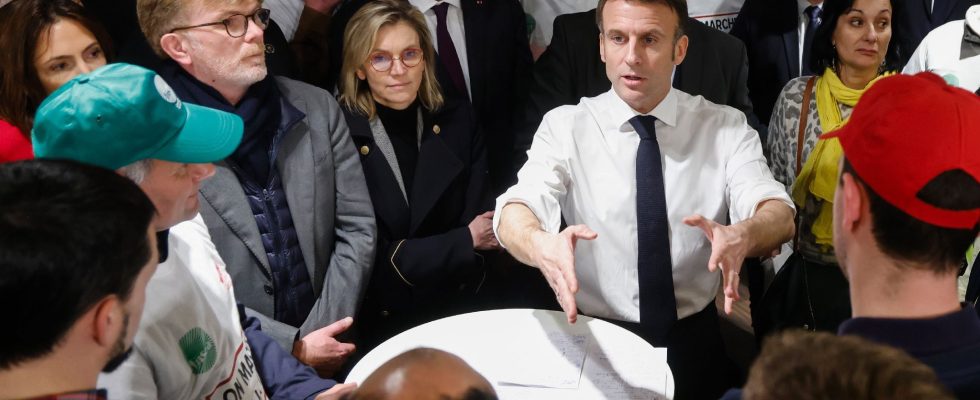After the fiasco of the organization of a “big debate” by the Elysée on the occasion of the Agricultural Show, the President of the Republic Emmanuel Macron inaugurated the event, this Saturday, February 24, in a climate high tensions and several hours late, due to clashes between demonstrations and the security service and then the CRS. After a breakfast with the main union officials, the head of state improvised a debate with farmers, distilling several commitments. Here is the summary.
An “emergency cash flow plan”
Emmanuel Macron spoke of an “emergency cash flow plan” to relieve farmers, with meetings which will take place from Monday. “Starting next week, the ministers here present with me (from Agriculture Marc Fesneau and the delegate minister Agnès Pannier-Runacher), with their colleague from the Economy and Finance (Bruno Le Maire), will bring together the banks and “also all sectors to be able to put in place these cash flow plans”, he indicated. “We will launch a census in each region of farms which are in the greatest cash flow difficulties to be able to support them,” added the president.
“Floor prices”
The Head of State formulated the objective “that we can arrive at” floor prices which will make it possible to protect agricultural income”, as part of the preparation of a new law governing relations between the actors of food. These “floor prices” will be based on production cost indicators on which each sector (poultry, milk, beef, etc.) had to agree to objectively assess farmers’ production costs. These indicators already exist, but are not sufficiently taken into account for beef and milk, breeders criticize. On the other hand, taking this indicator into account is almost automatic in the poultry sector.
“This is the most engaging thing we have ever done, what we are saying to ourselves,” said Emmanuel Macron, adding that for him it was a question of making these indicators “opposable”.
“Major general interest”
Emmanuel Macron is committed to “recognizing our agriculture and our food as a major general interest of the French nation. This will be enshrined in law, which will allow our agriculture to be protected in a firm and solid manner.” Damien Greffin, one of the vice-presidents of the majority FNSEA union and a cereal producer in Essonne, told AFP on Friday that he wanted to “hear the president say that agriculture was of major general interest, which placed it above other interests.
A source within the executive then simply clarified that such a mention implied “legal consequences”. In its efforts to calm the anger of farmers, the government explained that it had drawn ideas from the bill proposed by Senator LR Laurent Duplomb, which notably plans to declare artificial water reserves for “major general interest”. irrigation, in order to facilitate their construction.
Questioned on Saturday by AFP, Norbert Foulquier, professor of public law, found that the expression “resembles a notion in the environmental code: the imperative reason of major public interest”, “which allows the establishment of more equipment easily, even in areas where there are protected species. “If the legislator poses the presumption – which must then be verified on a case-by-case basis – that agriculture is a major reason of general interest, this would facilitate the qualification of public utility which may be necessary for agricultural equipment projects “, also believes the lawyer, who cannot be affirmative in the absence of a text presented by the executive.
The announcement in any case caused a positive reaction from FNSEA members, such as Yohann Guedon, 48 years old, pig breeder in Charente: “This recognition is that of the legitimacy of our activity, of general interest, which protects us against small groups. A water reservoir project will be a priority.”
Pesticides
The president reiterated his desire to avoid a pesticide being banned in France before the rest of the European Union, to avoid distortions of competition. For this, he wants the French health agency, Anses, which is independent, to remain aligned with the European calendar and therefore not to decree a ban in France on a product which would remain authorized in neighboring countries, as has been the case. cases for several pesticides in recent years (including the herbicide S-metolachlor). ANSES’s bans are generally motivated by imperatives to protect human health and the environment.
In 2014, emphasized Emmanuel Macron, “I was not there, but there was a law which entrusted” to Anses “powers which were [auparavant] at the Ministry of Agriculture.” “Anses works on a scientific basis […] and therefore makes decisions which are then binding on the administration. […] I can’t do anything about it […] and so we take back power by saying: ‘We’re doing it at the European level,'” he said. The head of state also said he wanted to look at the possibility of “reopening at the European level” banned molecules, without explaining what he meant.
Right to make mistakes
Among multiple government commitments on the simplification of standards and the relaxation of controls, Emmanuel Macron also told farmers that he wanted to extend the “right to make mistakes” to the agricultural world, “which we do not have managed to do so far”, due in particular to restrictions linked to EU law and environmental standards. A bill from MP LR Anne-Laure Blin exists in this sense.
“The right to make mistakes, I think it’s also quite simple, it’s to say when I do something stupid once, they advise me, they help me to correct it. If I do it twice, it’s “I’m cheating.”
